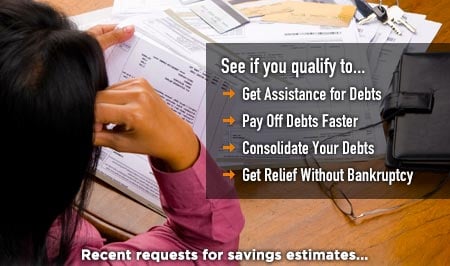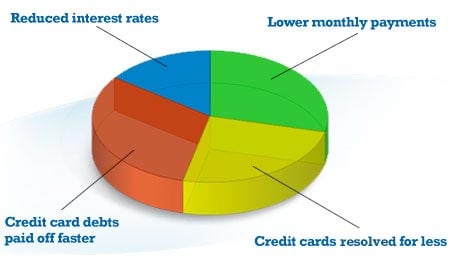
Credit Card Debt Consolidation
We all have faced financial challenges in our lives - perhaps due to a personal crisis such as an illness or a loss of employment - that may force us to seek assistance for our unmanageable credit card and other debts. Your situation may feel overwhelming and you may even feel as though there's no end in sight to your growing stack of credit card bills. The good news is, you have a variety of debt relief options available--including debt consolidation or debt management plans (DMPs) through a credit counseling agency, or even credit card debt settlement.
One of the solutions that have proven effective for many people is debt consolidation, or what's sometimes referred to as a debt management program (DMP). When you have accumulated several credit card bills and other unsecured debts (like medical bills, retail store charges, or utilities), it may be hard to keep track of all the payments you need to make. But if you consolidate all your high-interest credit card bills into a single lower payment that is made to a consumer credit counseling agency, as is the case with debt consolidation, it may make the process feel less daunting and easier to follow.
See how debt relief can help you. Answer a few, simple questions to get a free debt relief estimate and savings analysis - at no cost to you.
These days, you can easily find many for-profit as well as non profit debt consolidation organizations that offer various kinds of debt relief services, and we can help you connect with one of them if that is something you may be interested in.
Under a debt management plan, your unsecured debts will typically be consolidated into one monthly payment that will be made to a credit counseling agency. Once you enlist the services of a credit counseling agency, a credit counselor will make proposals on your behalf - proposals requesting that credit card companies lower your interest rate or waive penalties and late fees. When your creditors have a better understanding of your financial situation, they will be placed in the debt management plan and will typically agree to a repayment plan that is, hopefully, more affordable and more manageable for you.
Because the terms associated with debt relief are so closely intertwined, you may find it hard to identify the differences between them. That's why we have provided this information for you - so you can easily understand what makes each option unique from the other.
Debt Consolidation Loan
One other option that many consumers pursue is to get a debt consolidation loan. Keep in mind that unlike debt consolidation or a debt management program, a consolidation loan is simply a loan that typically combines all your high interest debts into one, lower interest loan.
But a word of caution regarding a debt consolidation loan: While it is a workable and proven solution for paying off credit card debt, in some cases, people who take debt consolidation loans end up running high interest credit cards all over again. The problem then becomes two-fold; now they have new high-interest credit card bills PLUS a debt consolidation loan. Another issue of concern: If you use your home to secure a loan, you may have put your home at risk if you default on the terms of your loan.
Explore your debt relief options. Request a free debt relief estimate and savings analysis, at no obligation to you.
Debt Settlement
Some consumers with uncontrollable amounts of debt may even consider debt settlement (or debt negotiation), which is a perfectly legal solution that can help people settle credit card debt for less than the full amount owed, if creditors agree to settle and the consumer can set aside a lump sum amount sufficient to settle. Under a debt settlement program, creditors may agree to settle your debt for a significantly lesser amount than what you owe them. Debt settlement clients are typically advised to stop paying their credit card bills and instead save up money to negotiate a one-time settlement fee. Now, like the other debt relief methods we mentioned, debt settlement is also fraught with risks and negative outcomes. While you are not paying your credit cards as agreed, you could also face legal action as creditors try to recoup their losses.
Debt settlement will also normally have a negative impact on your credit, but not as severe or long lasting as bankruptcy. And there may be tax consequences associated with debt settlement, so keep this in mind when you are considering negotiating your debts. Despite all these concerns with debt settlement, more and more people are "settling" their credit card debts each day as a viable option to personal bankruptcy, which has far more serious and long-lasting of an impact on finances and personal credit.
Compare Your Options
The bottom line is, when you decide that you're ready to tackle your credit cards and other unsecured debts, make sure that you have all the facts straight about the most popular methods of debt relief - whether it's consolidation or debt management, or debt settlement. If you would like to explore the benefits of debt relief, you may request your free debt relief analysis and savings estimate - at no obligation.





















